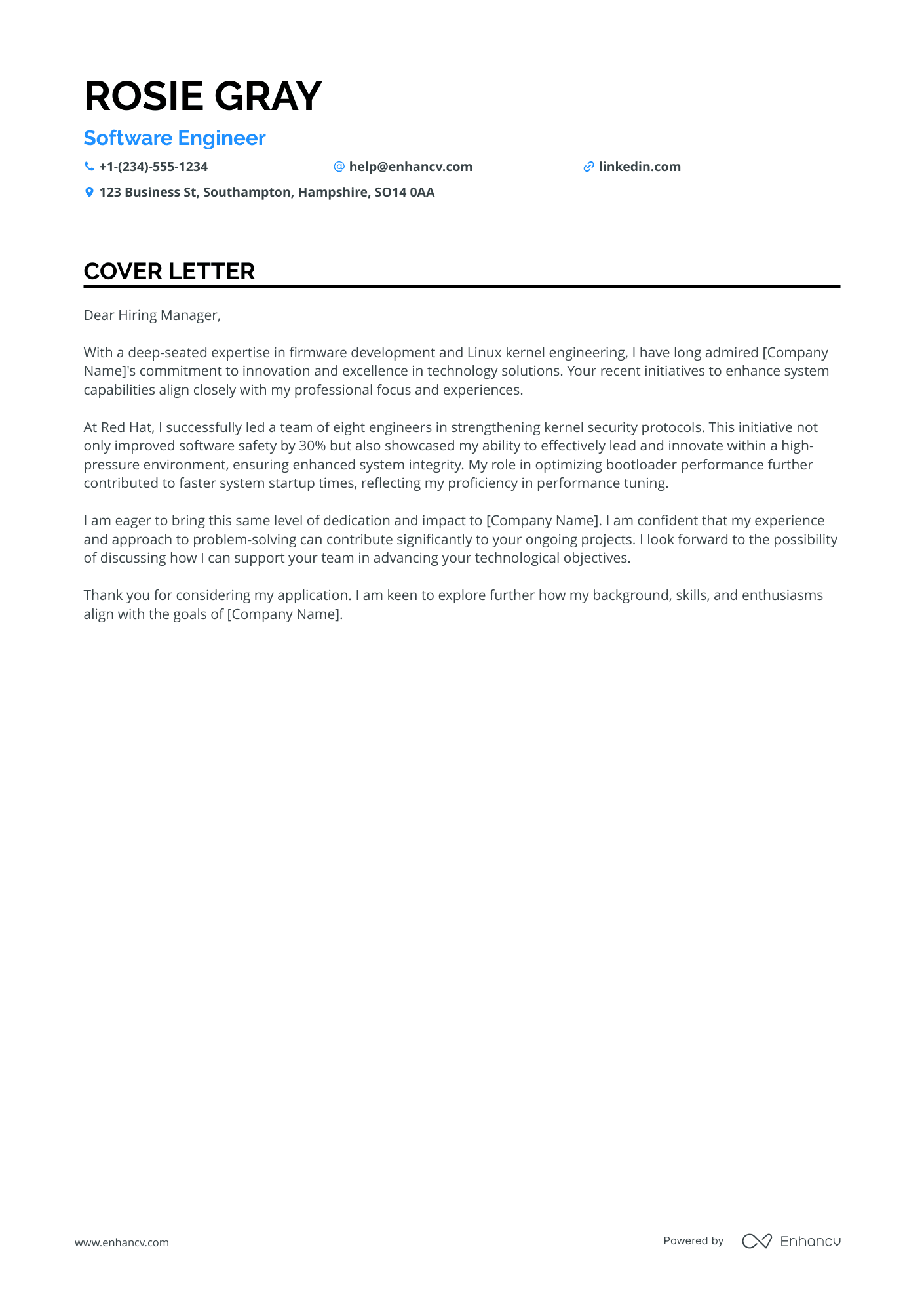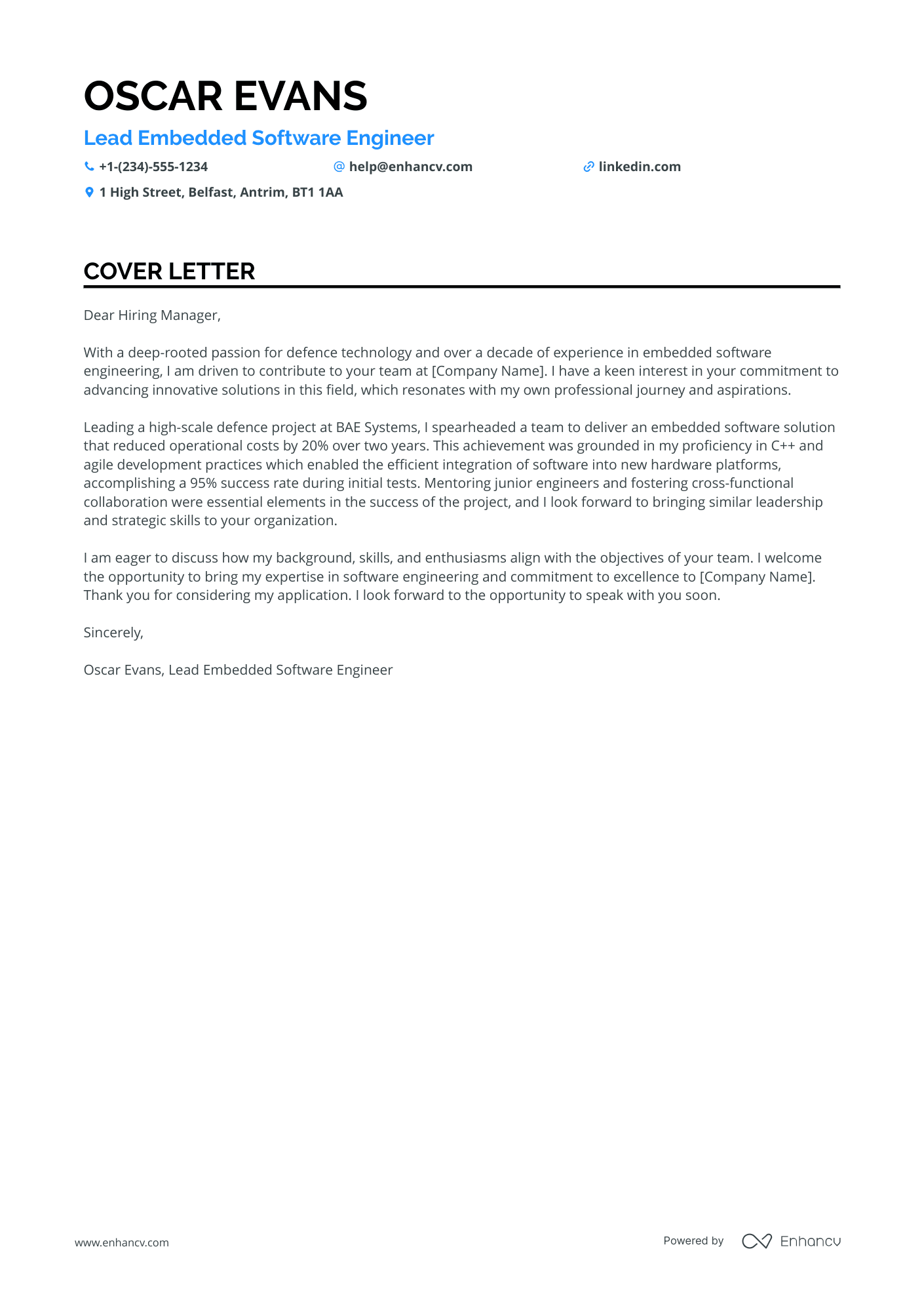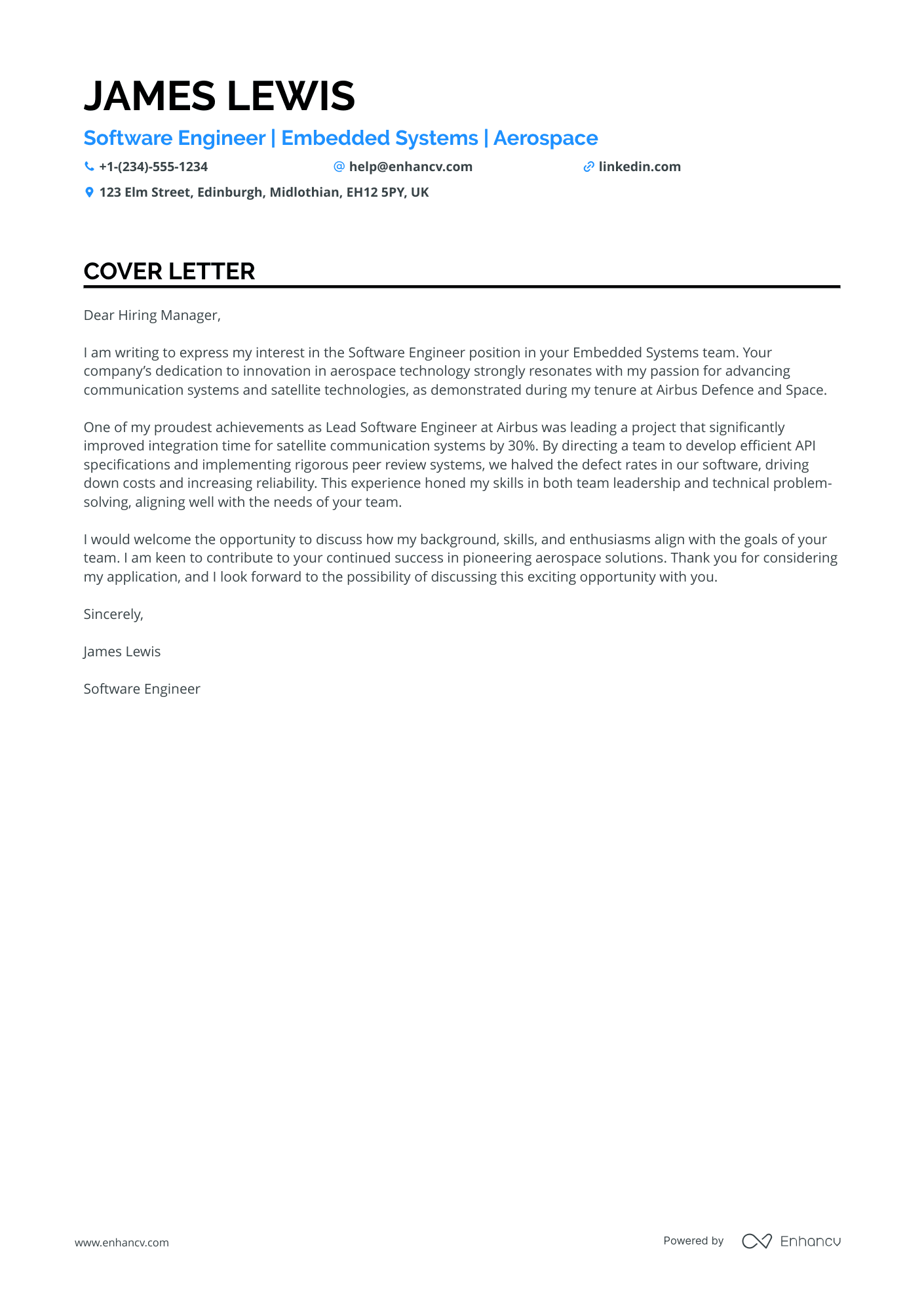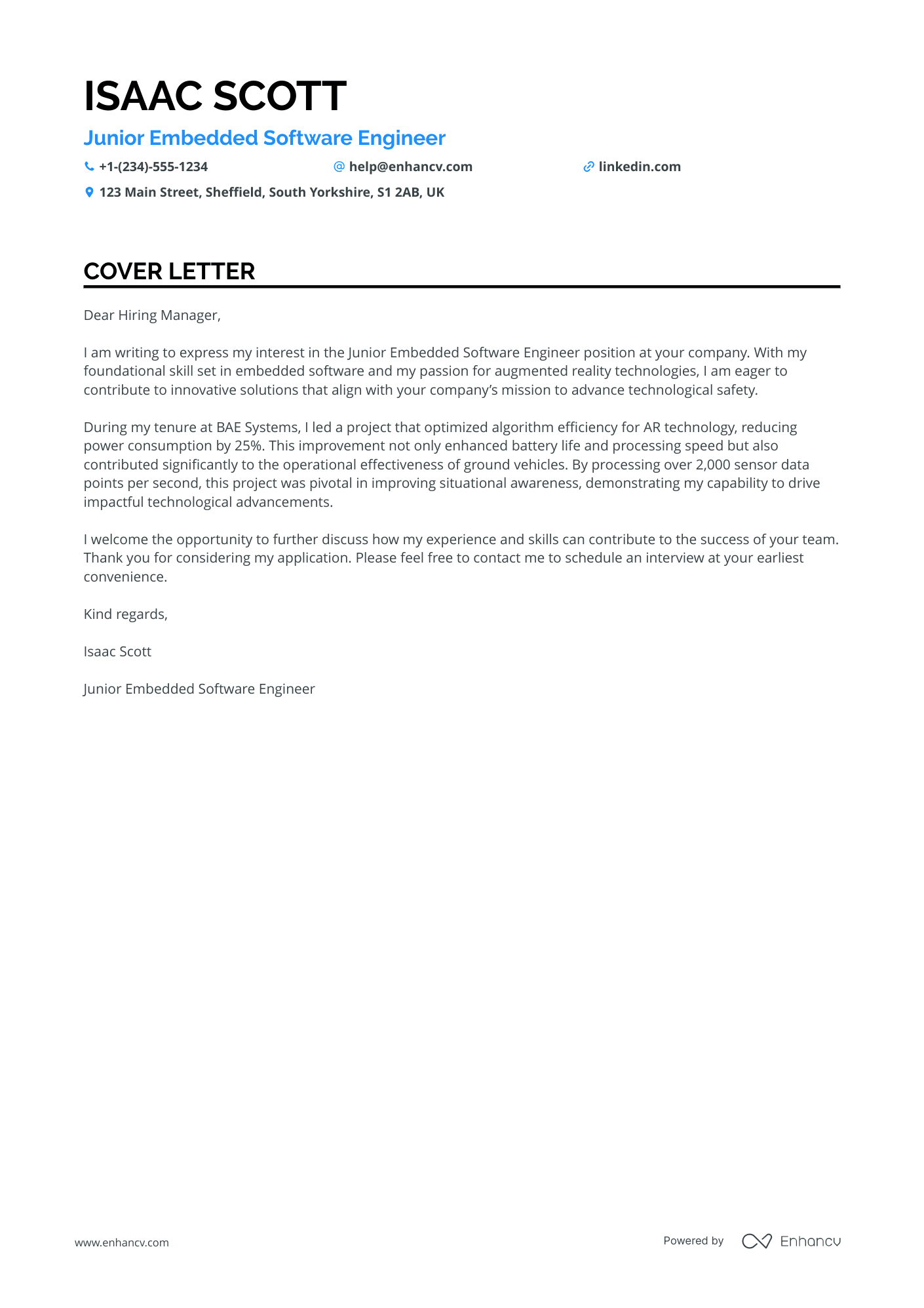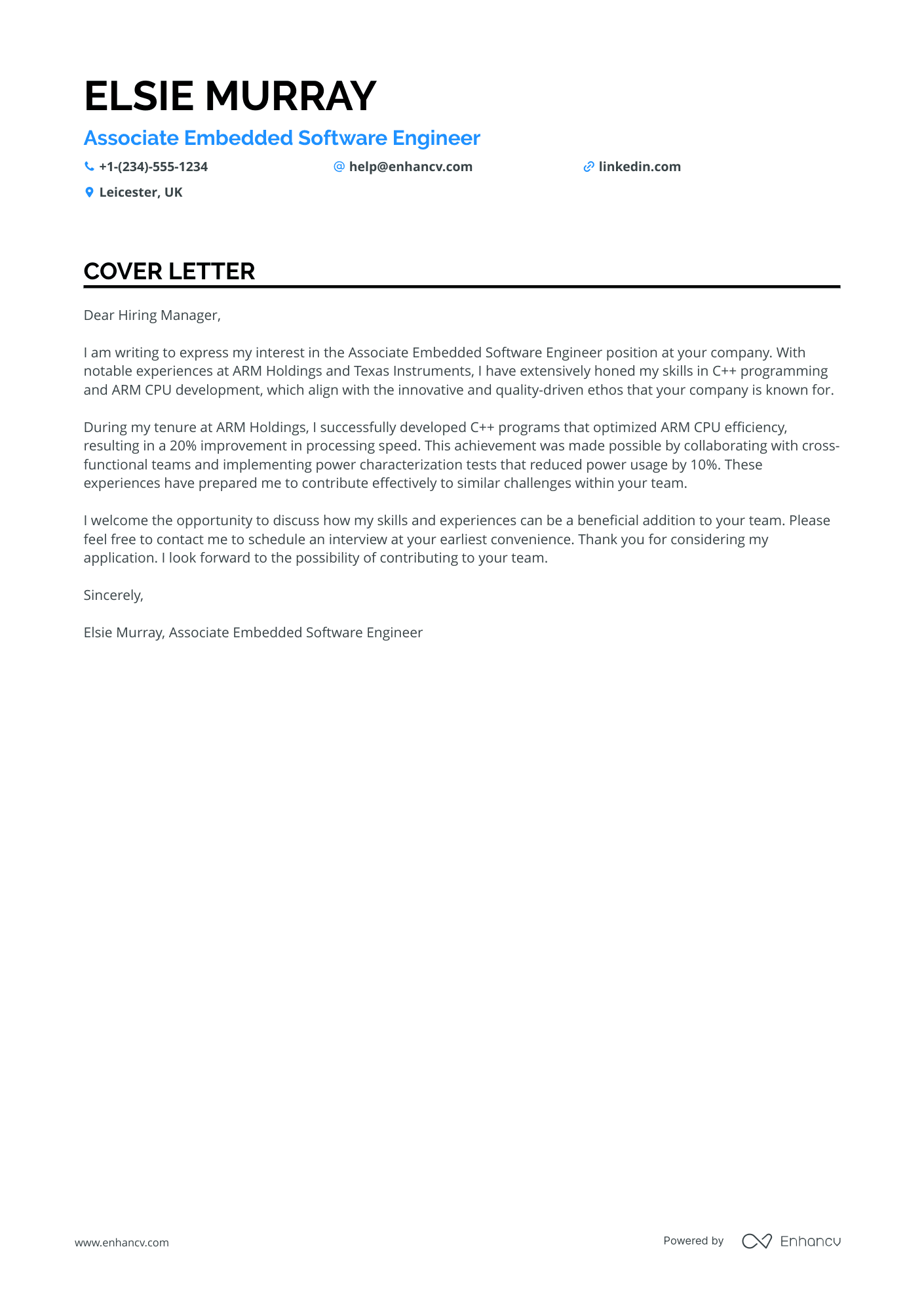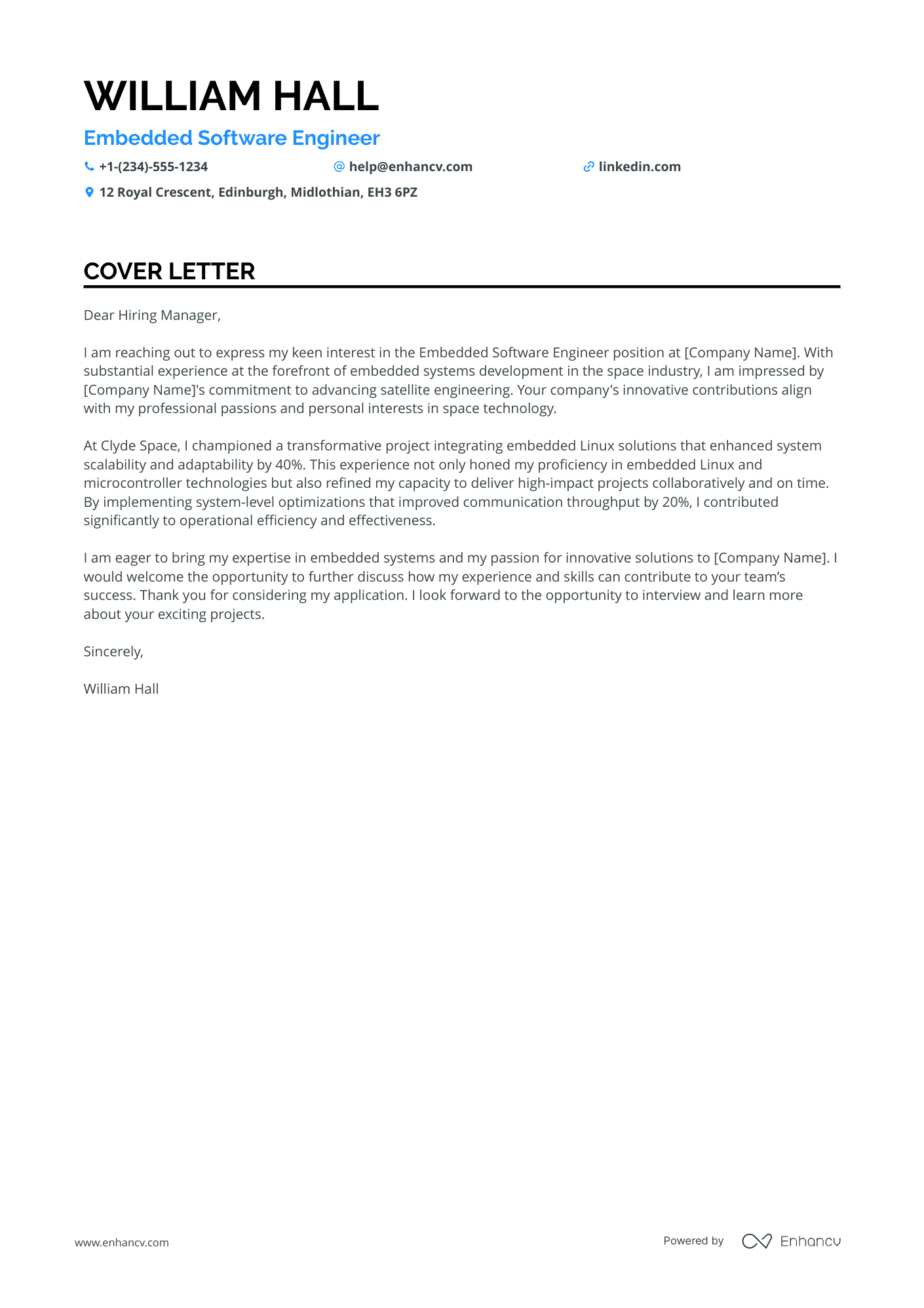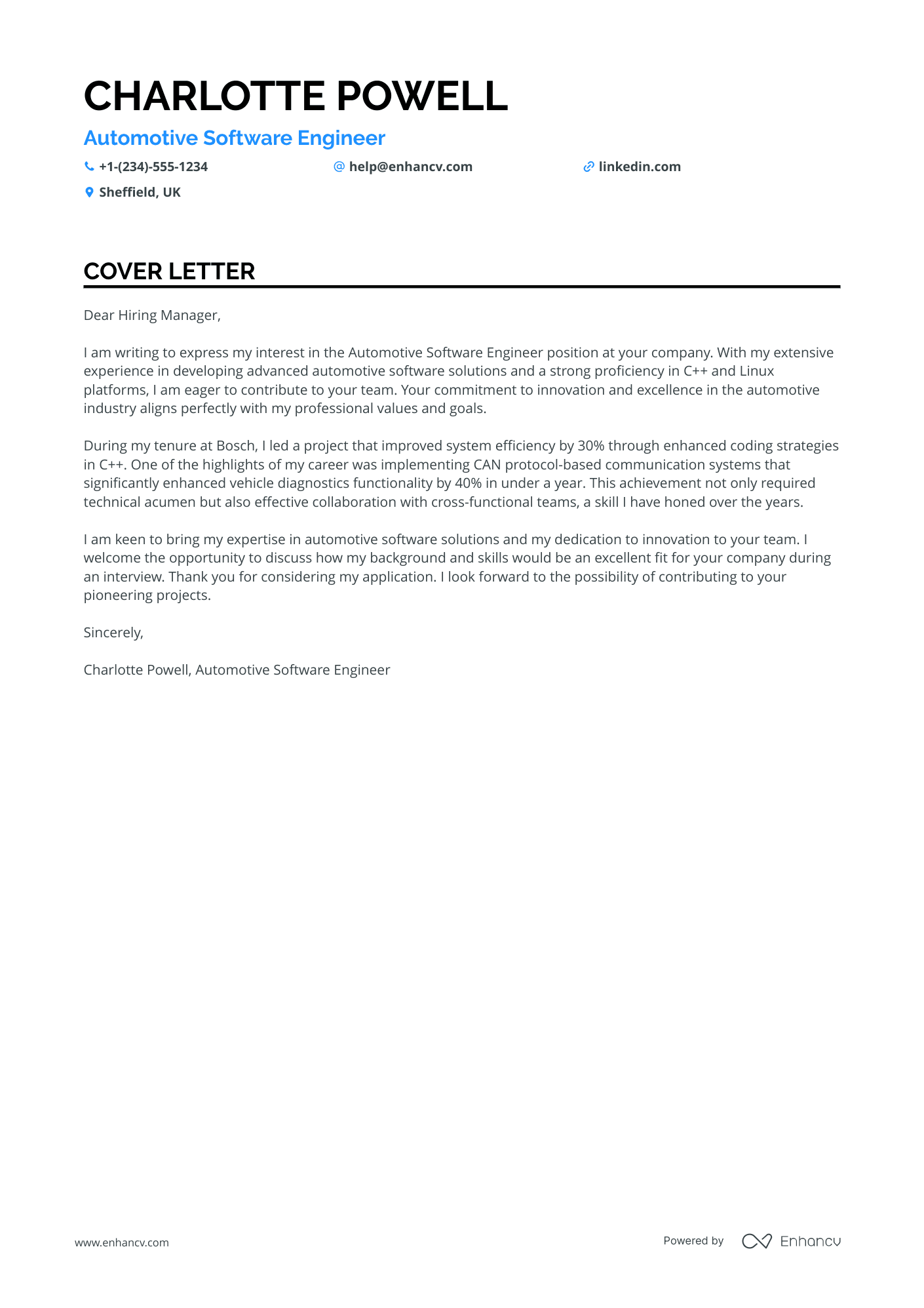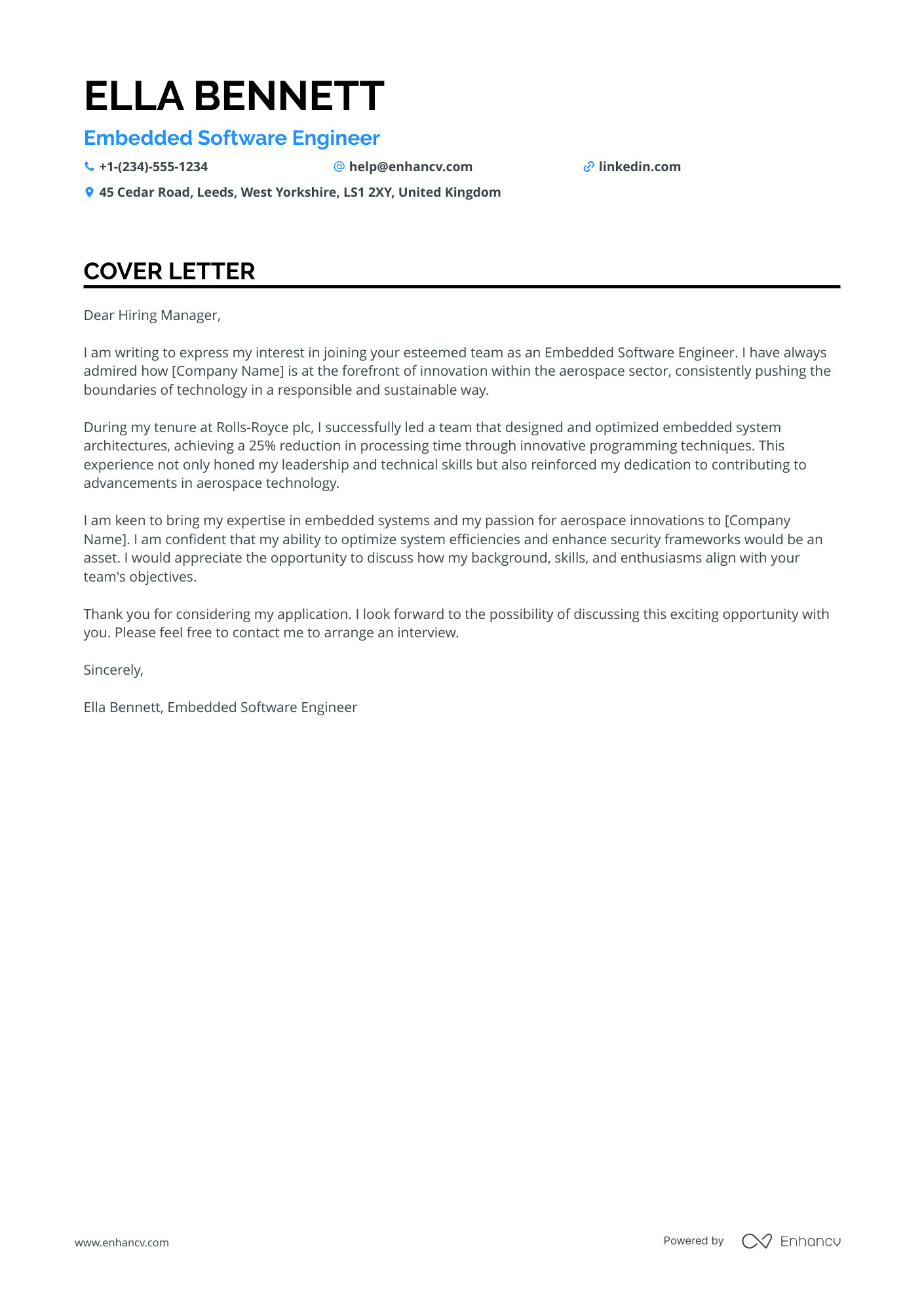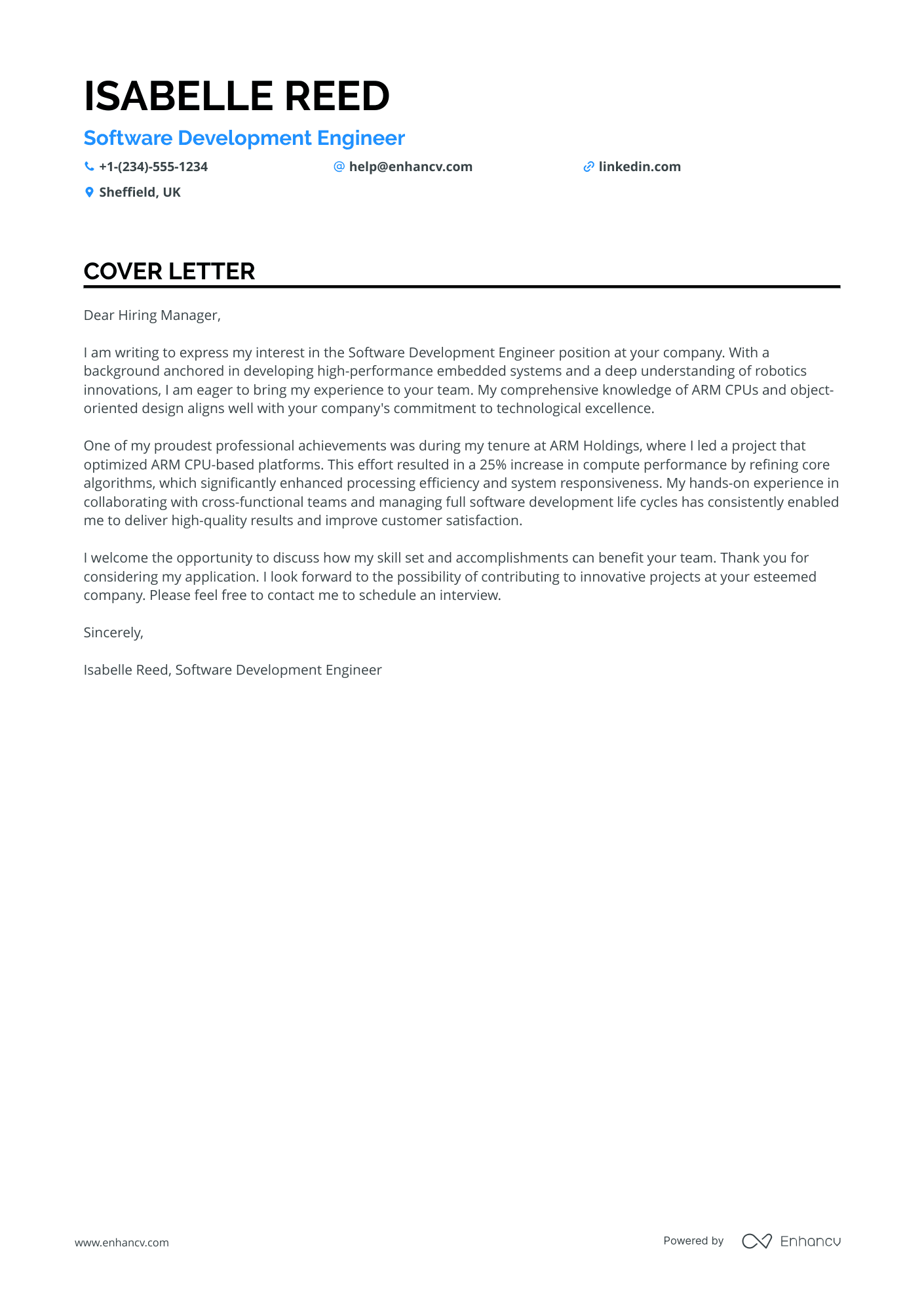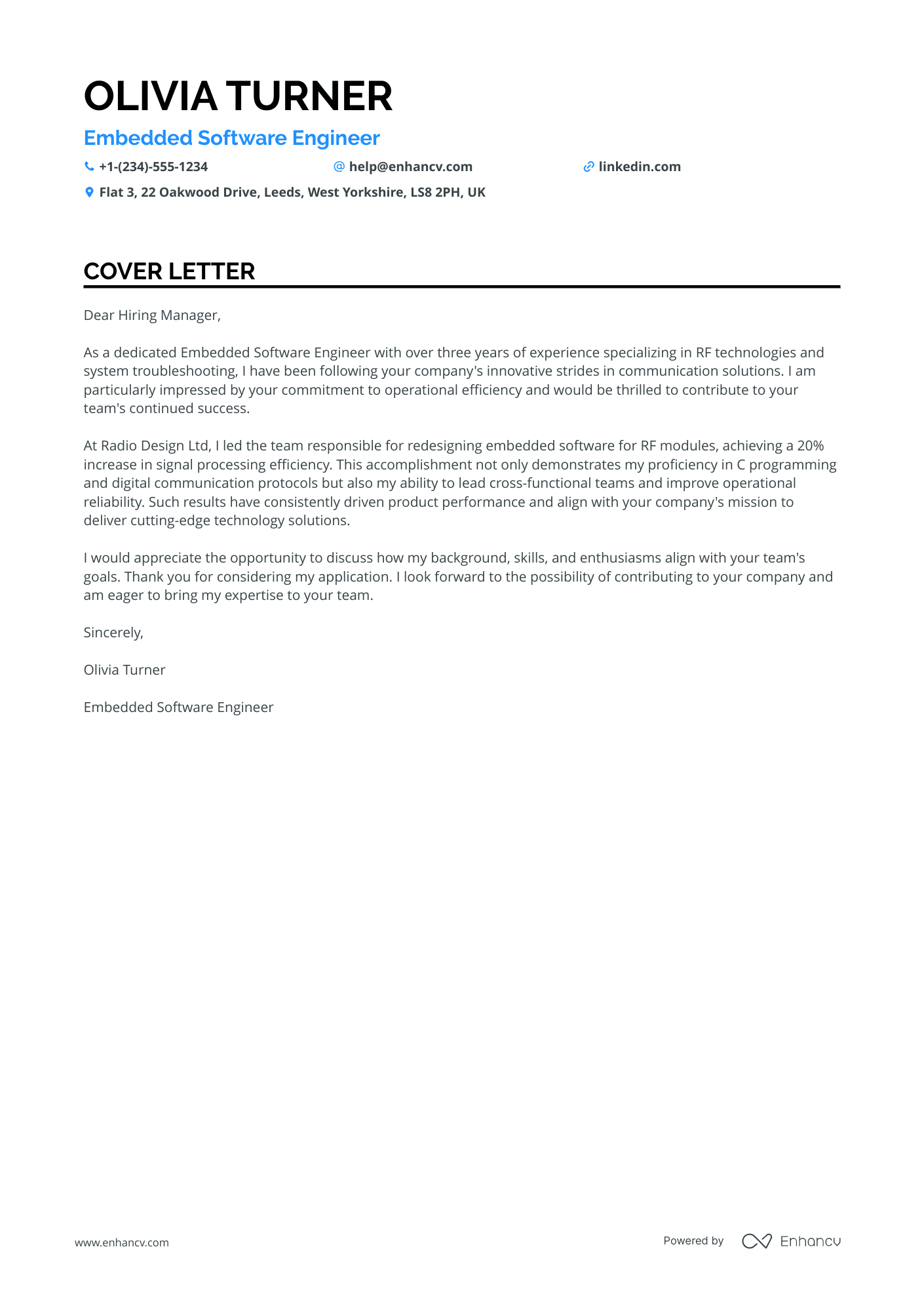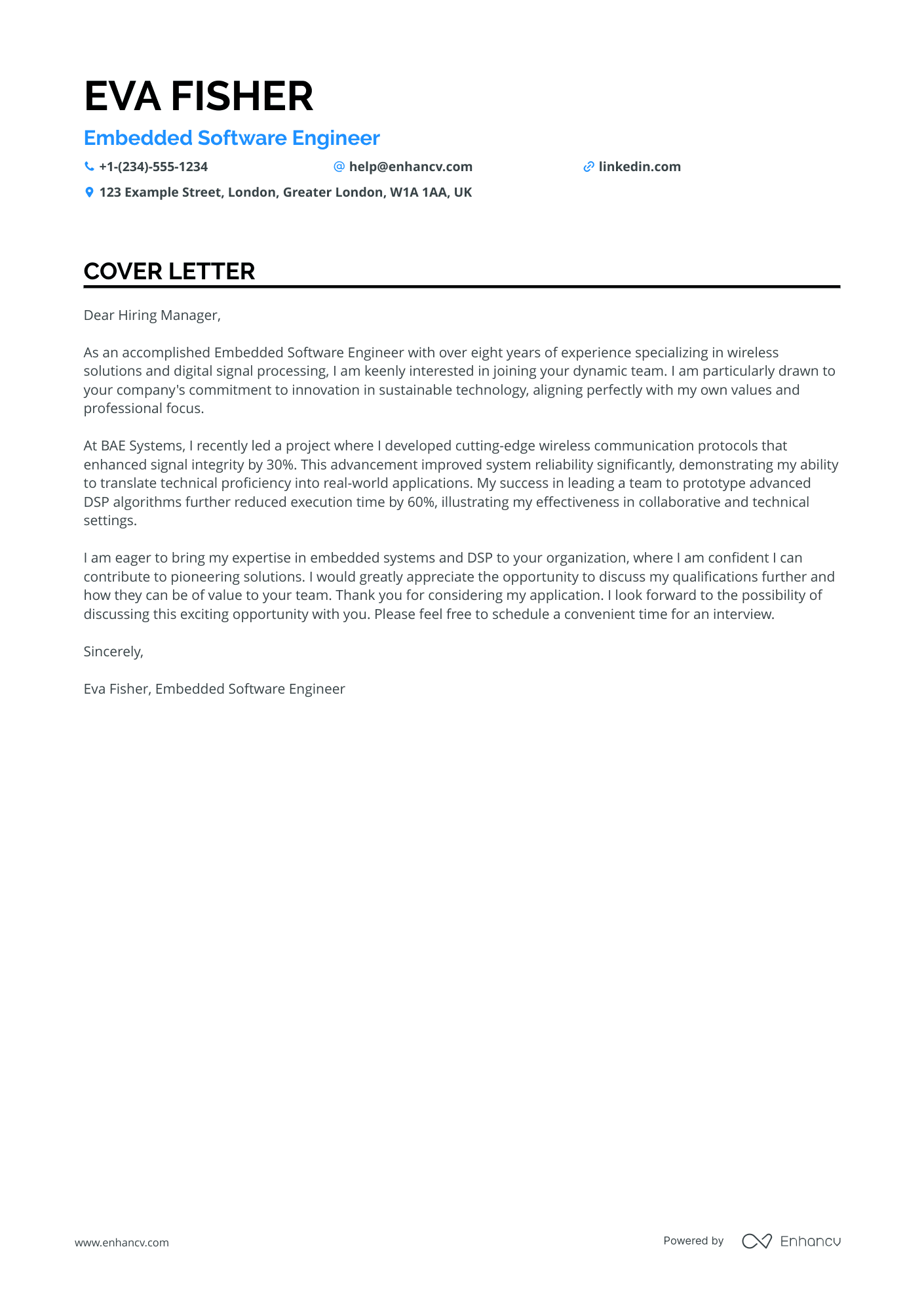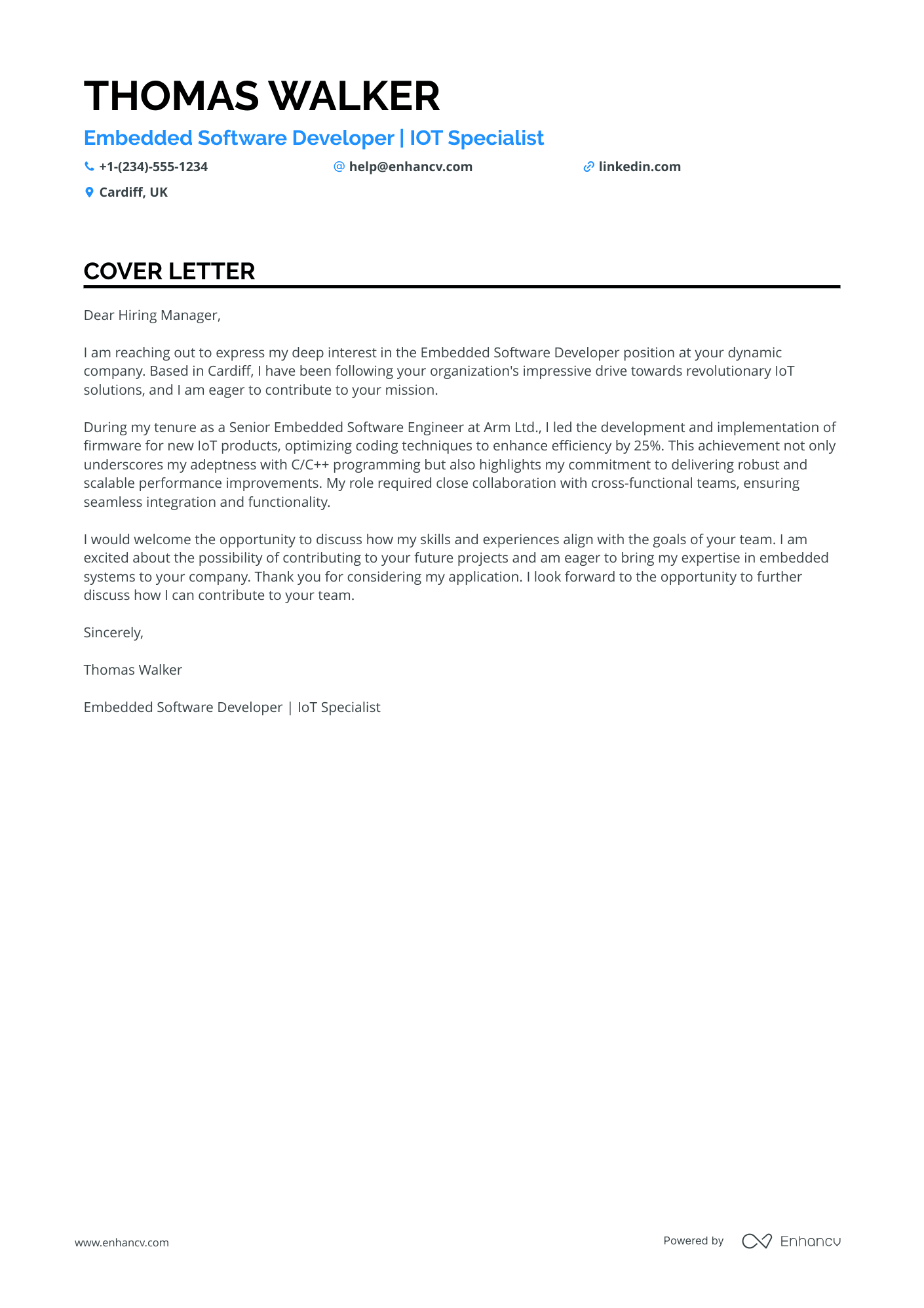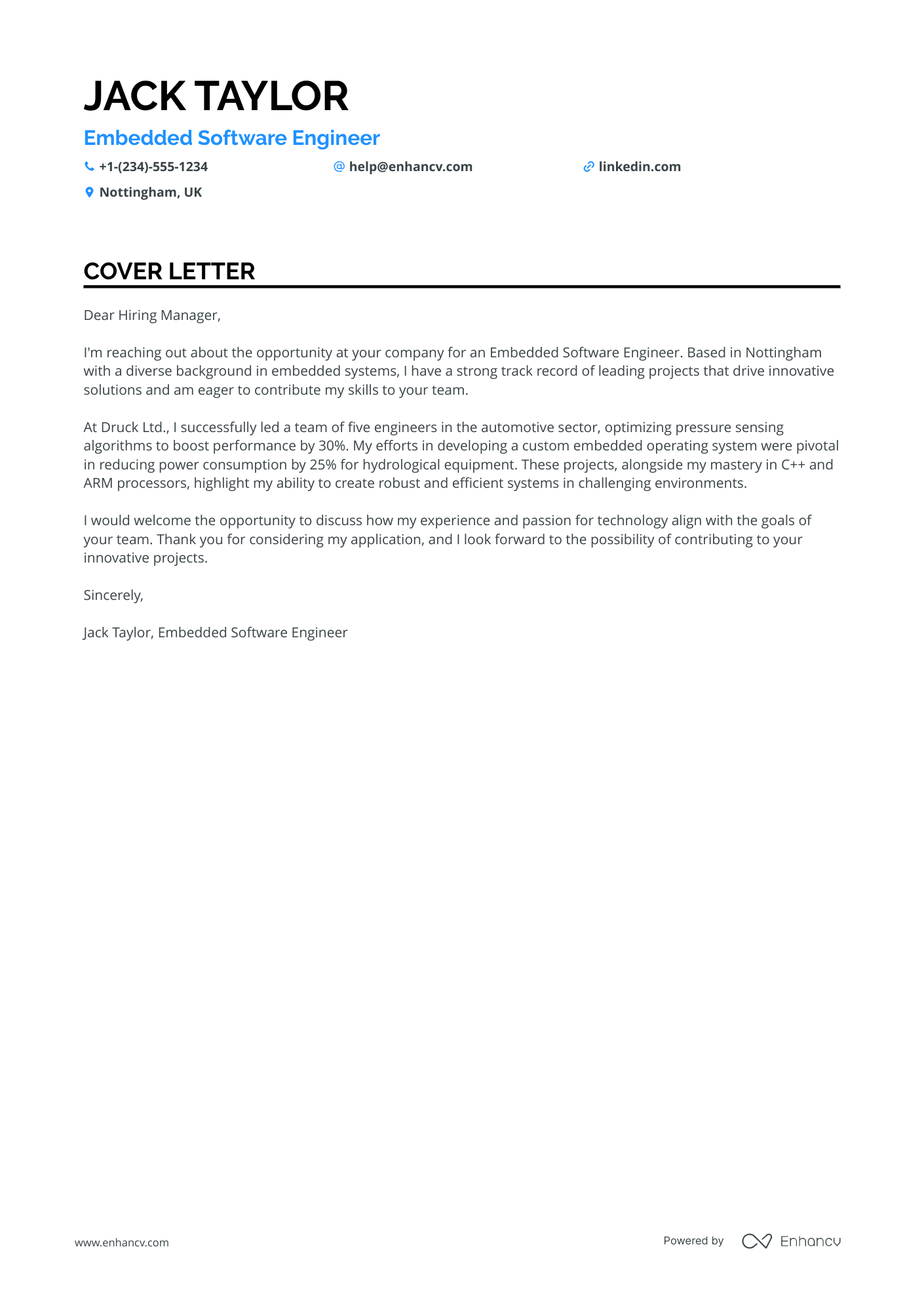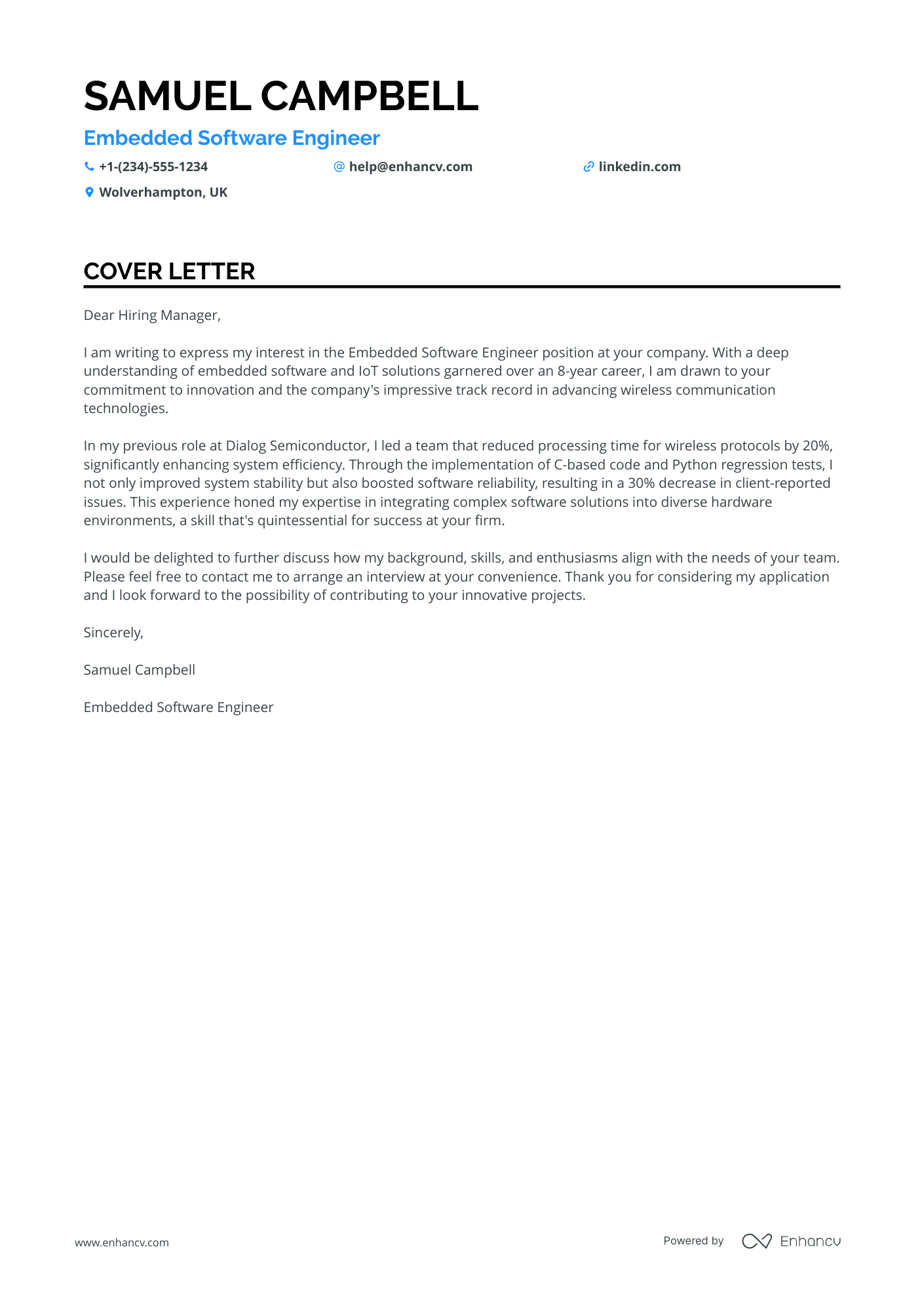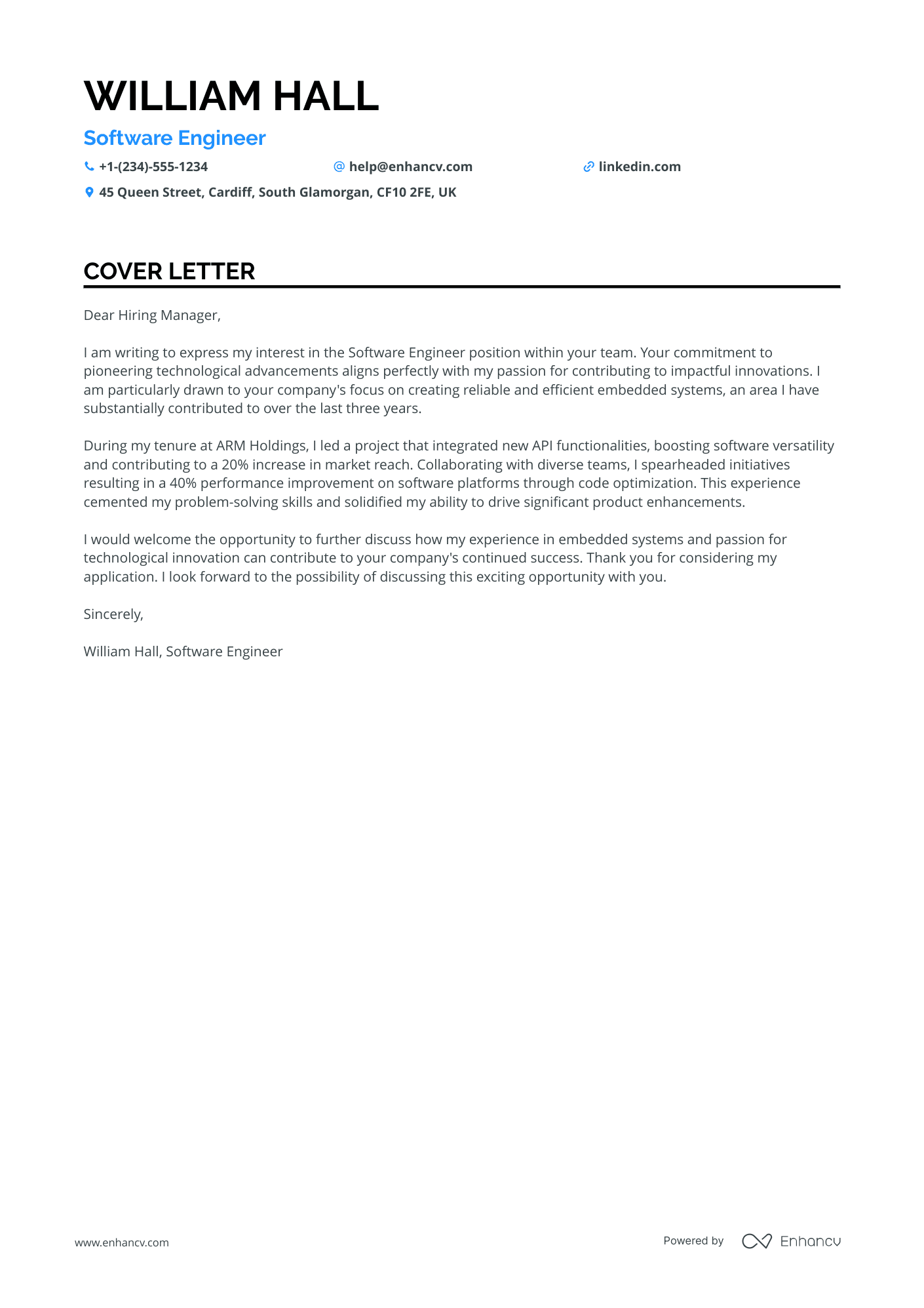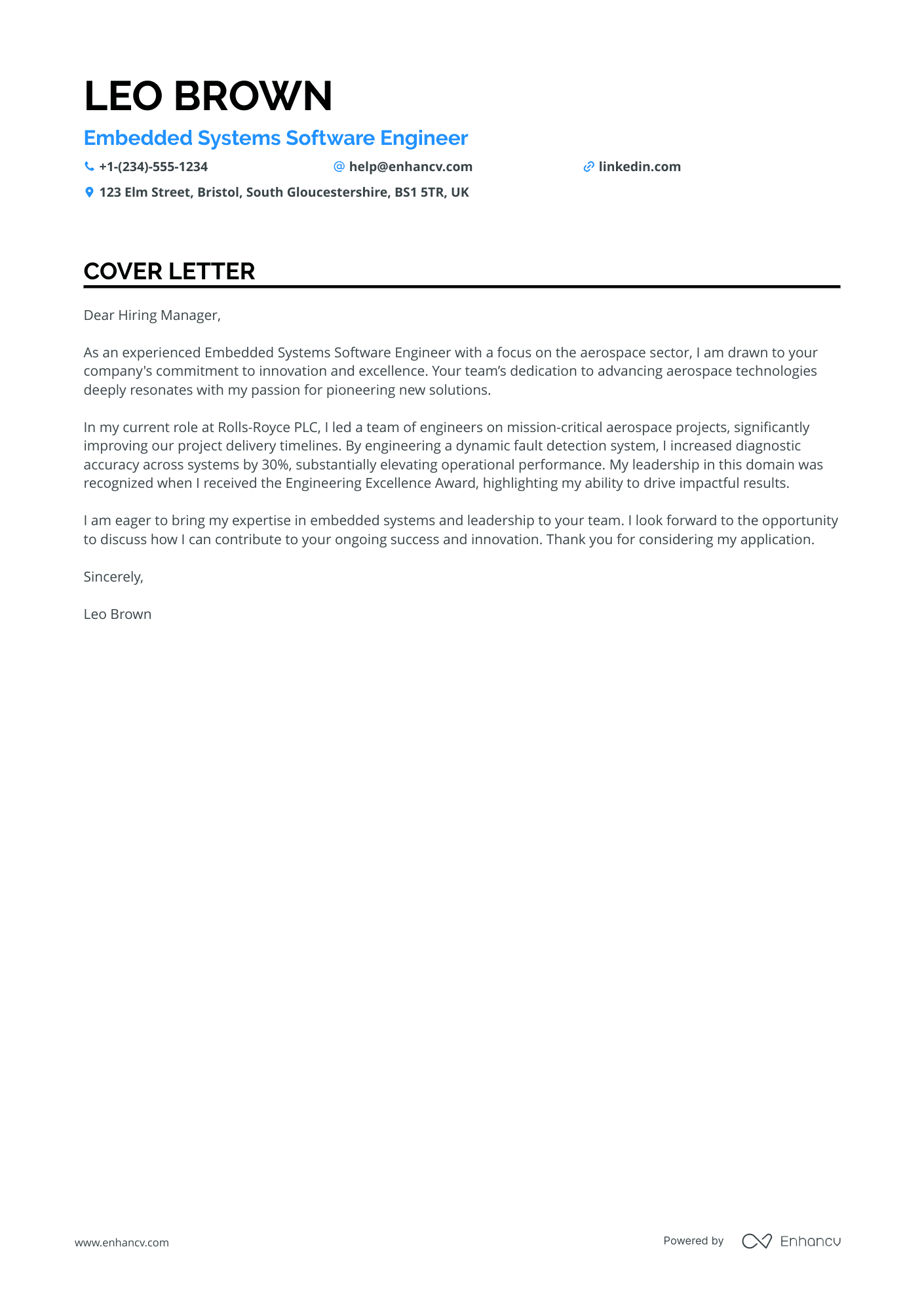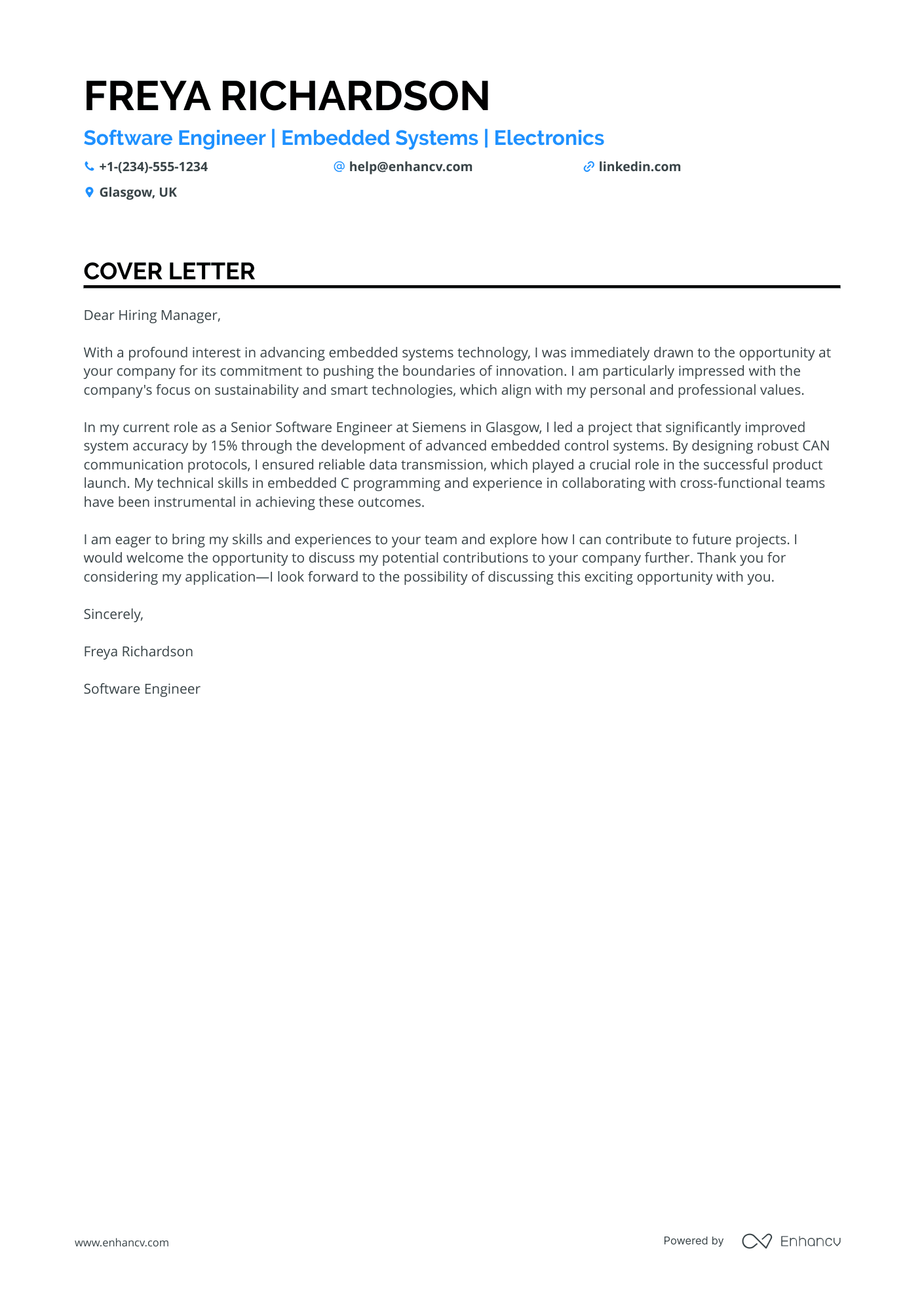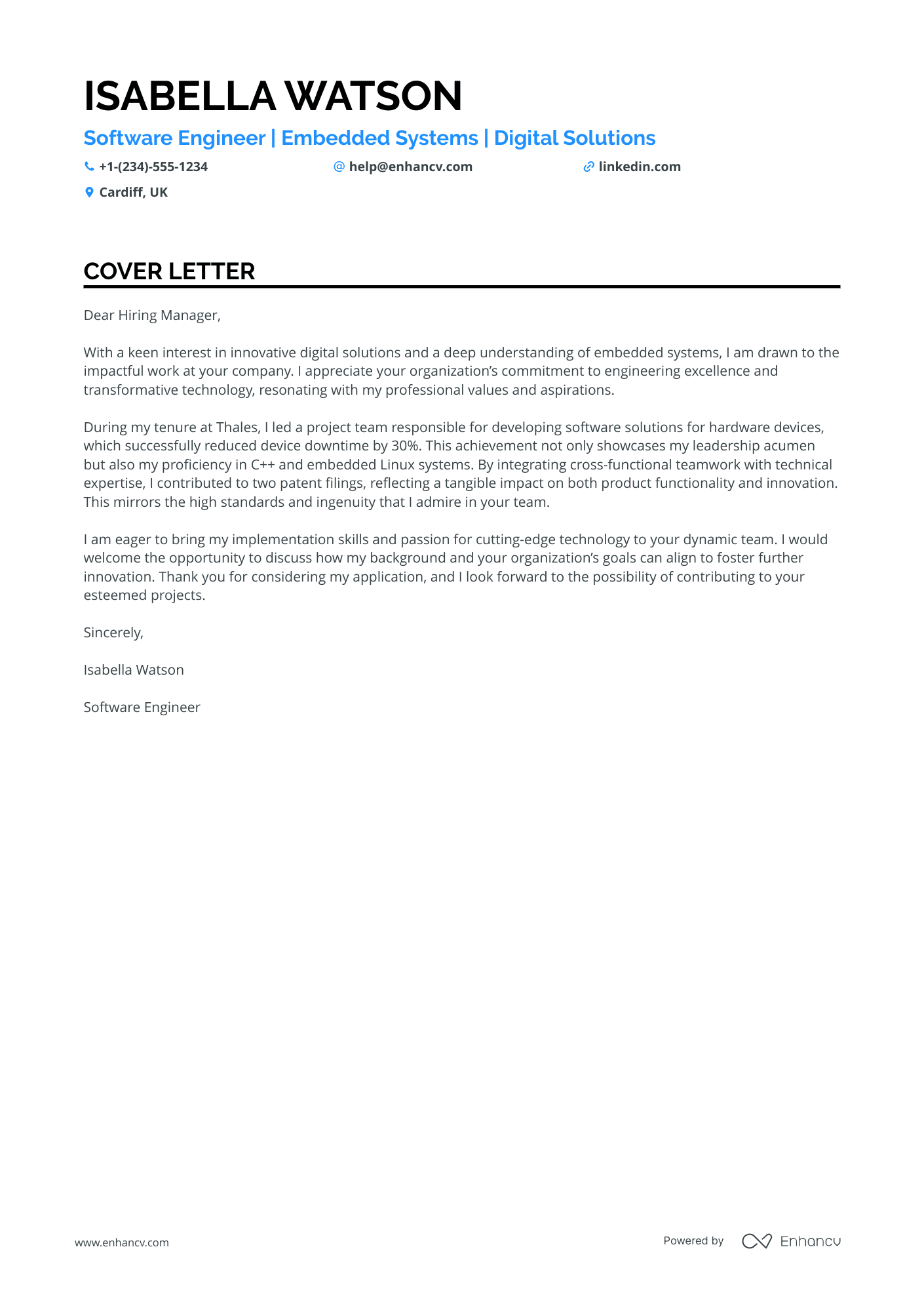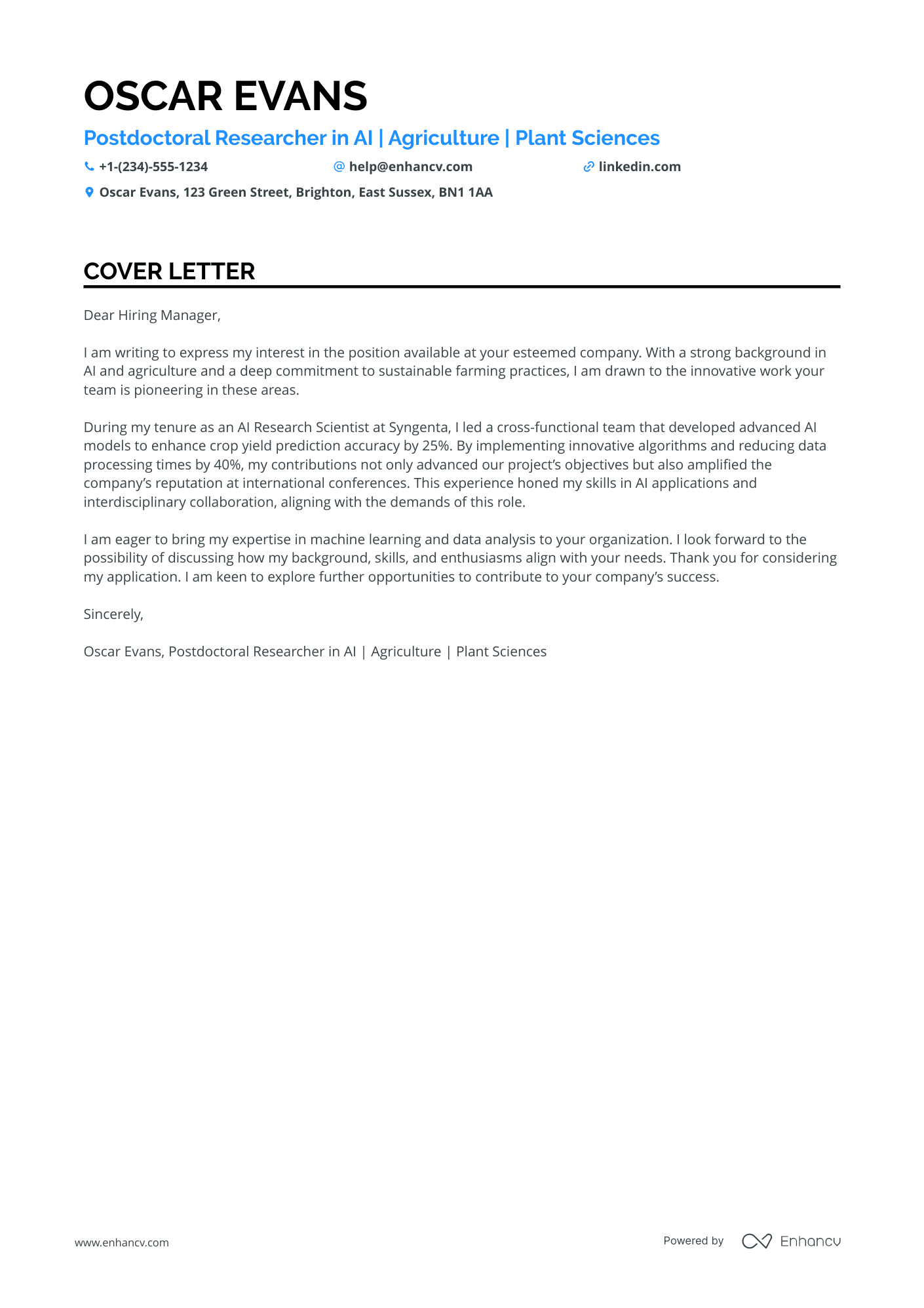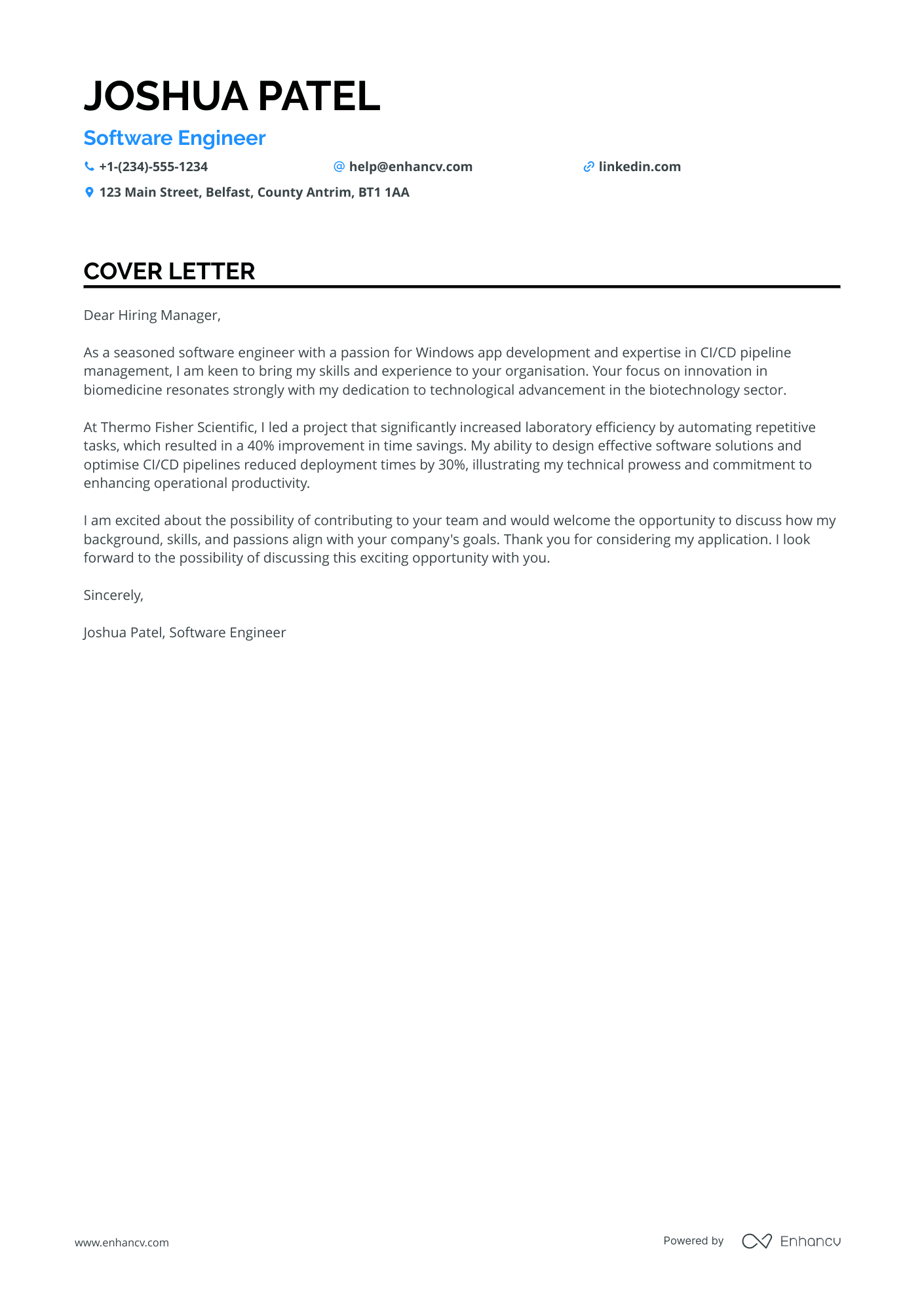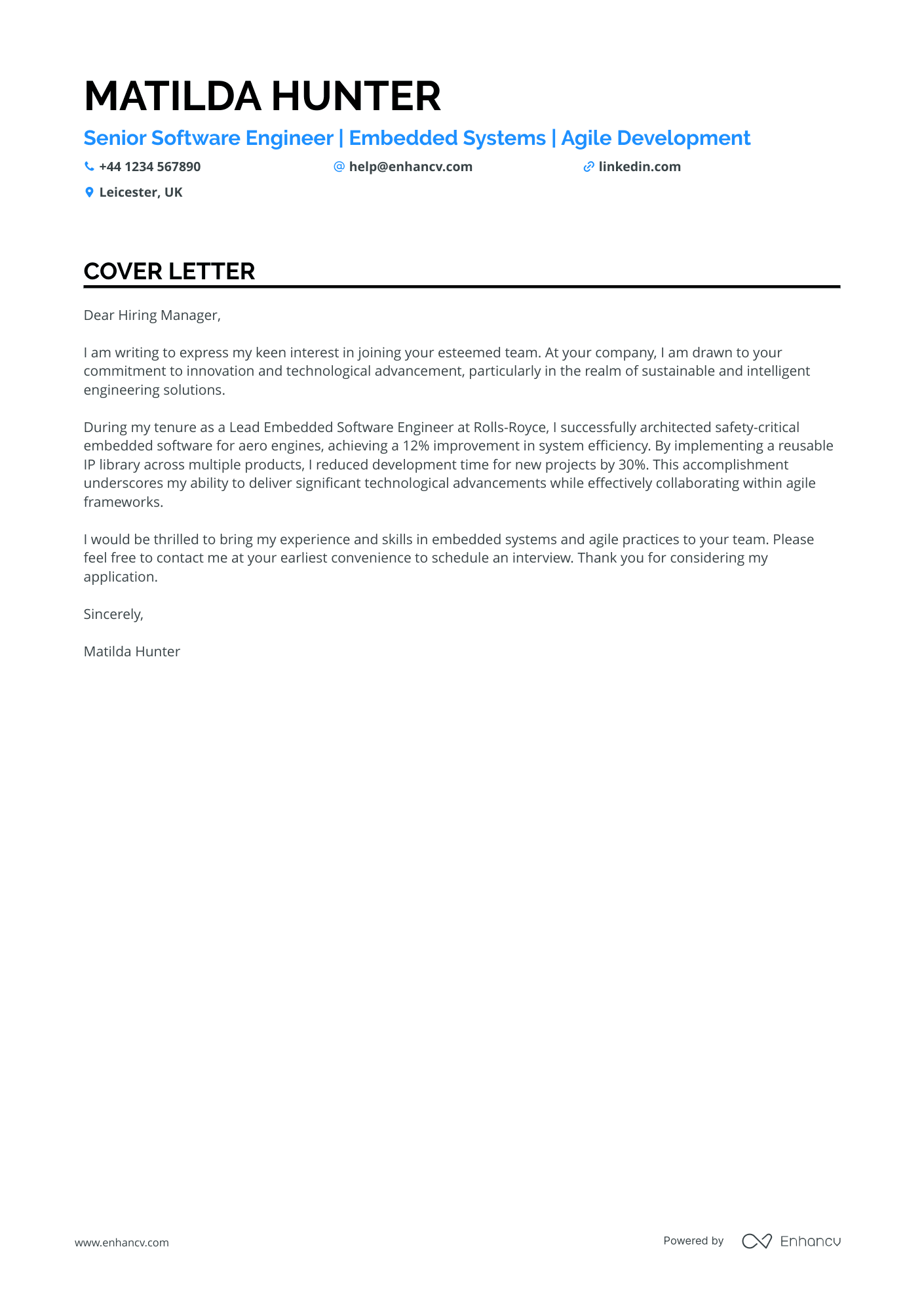Congratulations on completing your first cover letter. However, as you look back, you realise it’s simply a copy-paste of your CV.
Repeating your curriculum vitae is a common pitfall that many candidates encounter, making the cover letter redundant.
Your cover letter should provide fresh insights, adding more value to your application. It’s also the ideal space to address career gaps or major transitions that might not be covered in your CV.
In this guide, you’ll learn how to use your cover letter to demonstrate why you’re the best candidate for the role, while confidently addressing your career history and key achievements.
Cover letter examples for embedded software engineer
By Experience
Senior Embedded Software Engineer
- Highlighting Technical Expertise: The cover letter effectively showcases Rosie's strong technical skills in Linux kernel development, firmware development, and ARM systems, which are highly relevant for a software engineering role.
- Detailing Leadership Experience: Emphasising her leadership experience, such as mentoring junior developers and leading a team for kernel security enhancements, demonstrates her capability to manage and improve team performance.
- Stressing Open Source Contributions: Mentioning active participation in open-source communities and projects positions her as a proactive and collaborative engineer, which is a valued trait in the tech industry.
- Showcasing Educational Background: Highlighting an advanced education, including a Master's degree from a prestigious university, reinforces her dedication and strong foundation in computer science, relevant to the role.
Lead Embedded Software Engineer
- Highlight the RTCA-DO178C Standards Certification when applying for roles requiring expertise in high integrity systems, demonstrating compliance and understanding of industry standards.
- Emphasise your proficiency in C++ and Agile Development, particularly if the role involves managing complex, modular codebases and requires adapting to agile methodologies.
- Showcase leadership and mentoring attributes by discussing tangible outcomes, like leading a team to reduce operational costs and promoting team members' career progression.
- Illustrate successful cross-functional collaboration experiences, particularly in contexts where the success rate is a key performance metric, reflecting your ability to integrate software into diverse hardware platforms effectively.
Principal Embedded Software Engineer
- Highlighted Experience: Emphasising over 9 years of specialised experience in embedded systems and aerospace applications is crucial for demonstrating expertise in a niche field.
- Relevant Skills: Focusing on technical proficiencies like C/C++ programming and real-time operating systems showcases core competencies essential for a software engineer in embedded systems.
- Coursework and Continuous Learning: Mentioning relevant courses such as "Embedded Electronics for Space Applications" displays commitment to continuous professional development and niche knowledge acquisition.
- Key Achievements: Including specific awards and recognitions, such as excellence in embedded software development, establishes credibility and evidences impact and effectiveness in past roles.
Junior Embedded Software Engineer
- Highlighting specific technical skills such as C++, Rust, and sensor integration which are crucial for a successful career in Embedded Software Engineering.
- Showcasing impactful achievements such as improving code efficiency by 20% and enhancing real-time processing, reflecting the ability to contribute to technological innovations.
- Detailing relevant experience, such as collaborating on projects with augmented reality capabilities and optimising algorithms for better battery life and processing speed, demonstrating hands-on engagement in the field.
- Emphasising a commitment to safety, with experience in implementing safety protocols that improve adherence to field regulations, which is crucial in engineering roles involving embedded systems.
Associate Embedded Software Engineer
- Specific Technical Expertise: The cover letter effectively highlights Elsie's expertise in C/C++ and ARM-based CPU development, which is crucial for an embedded software engineer role.
- Quantifiable Achievements: The letter includes specific metrics such as a 30% performance increase and a 20% improvement in processing speed, which provide tangible evidence of success and impact.
- Cross-Functional Collaboration: It emphasises the candidate's ability to work with cross-functional teams, crucial for roles that require coordination between hardware and software components.
- Continuous Skill Development: The inclusion of relevant courses demonstrates a commitment to ongoing learning and staying updated with the latest technologies in the field.
Entry-Level Embedded Software Engineer
- Emphasising hands-on experience with embedded systems and satellite technology, demonstrated through past roles and specific achievements, helps establish credibility and expertise in the niche market of space technology.
- Highlighting proficiency in key programming languages and technologies relevant to the role, such as C, Python, and embedded Linux, provides assurance of technical capabilities needed for an Embedded Software Engineer.
- Showcasing achievements like the "Efficiency Improvement Award" and "Innovative Design Recognition" draws attention to a proven track record of improving operational efficiency and system performance, which are crucial in this industry.
- Discussing ongoing personal and professional development, through courses, certifications, and active participation in open-source projects, conveys a commitment to staying current with evolving technologies and contributing to the field.
By Role
Embedded Software Engineer in Automotive
- Emphasise Industry-Specific Skills: Clearly highlight your expertise in crucial technologies for the automotive software engineering role, such as C++ programming, Linux platform development, and CAN protocol, showcasing your strong technical capabilities.
- Showcase Quantifiable Achievements: Include specific metrics and results, such as the 30% increase in system efficiency, to demonstrate the tangible impact of your contributions to previous projects and employers.
- Detail Project Leadership Experience: Highlight your experience leading Agile teams, improving project completion times, and achieving faster software delivery, which underscores your ability to manage and optimise projects effectively.
- Highlight Relevant Education and Courses: Feature your advanced education, such as a Master of Engineering, along with specialised courses related to automotive embedded systems and C++ for embedded applications, to establish your strong educational background in the field.
Embedded Software Engineer in Aerospace
- Specialised Experience Highlight: Highlighting over 8 years of experience in embedded software engineering, specifically in the Aerospace and Defence sector, showcases relevance and depth of expertise crucial for the role.
- Achievements and Impact: Emphasising quantifiable achievements such as enhancing system efficiencies by 40% and improving processing time by 25% helps depict the candidate's ability to make impactful contributions.
- Technical Skills Emphasis: Including a strong skill set related to the role, such as proficiency in C/C++ and ARM processors, alongside specialisation in security conceptual analysis, aligns well with industry demands.
- Leadership and Collaboration: Demonstrating leadership by leading a team and collaborating with cross-functional teams underscores the ability to manage projects and work effectively within a team-oriented environment.
Embedded Software Engineer in Robotics
- Emphasising relevant experience: The cover letter effectively highlights Isabelle's extensive experience in software and embedded systems development, with specific achievements that demonstrate her contributions to improving performance and efficiency.
- Featuring specific quantifiable achievements: Detailed accomplishments, such as a 25% increase in compute performance and a £200,000 cost saving, provide tangible proof of Isabelle's impact in her previous roles, making her a more compelling candidate for prospective employers.
- Highlighting relevant certifications and courses: Mentioning certifications such as the “Certified Embedded Systems Developer” allows the applicant to leverage specialised training and knowledge, underscoring their qualifications for roles in robotics and embedded systems.
- Demonstrating technical skills and tools: The inclusion of technical skills like C++, Java, ARM CPUs, and involvement with open-source projects, establishes Isabelle's proficiency and interest in the field, aligning with the needs of potential employers in software development engineering roles.
Embedded Software Engineer in Telecommunications
- Emphasising specialisation in RF technologies helps to establish expertise in a niche area crucial for roles in embedded systems and telecommunications.
- Highlighting proficiency in programming languages and platforms like C, FreeRTOS, and embedded Linux shows technical competence and readiness to handle job requirements.
- Showing quantifiable achievements, such as improving product performance by 20% or enhancing team competency by 50%, provides tangible evidence of past successes and potential for future contributions.
- Underscoring experience in cross-functional teamwork can indicate ability to collaborate effectively with diverse teams, essential for complex embedded systems projects.
Embedded Software Engineer in Defence
- Highlighting Technical Expertise: The cover letter effectively showcases Eva Fisher's expertise in embedded systems programming, particularly with C/C++ for wireless solutions, DSP, and SDR. For an Embedded Software Engineer role, this technical expertise is crucial.
- Emphasising Problem-Solving Outcomes: By providing specific metrics, such as improving signal integrity by 30% or reducing execution time by 60%, the letter communicates concrete achievements that demonstrate her problem-solving skills and impact on projects.
- Collaboration and Leadership: The experience section highlights collaboration with cross-functional teams and leadership in mentoring, which are important skills for successfully transitioning prototypes into commercially viable products.
- Academic and Professional Development: Mentioning the relevant educational background and additional courses, like the "Advanced Embedded Systems Design Course," adds credibility to her technical qualifications for a specialised engineering position.
Embedded Software Development Engineer
- Emphasising Industry Expertise: Highlighting over 7 years of experience in embedded systems and proficiency in C/C++ development, which is crucial for an Embedded Software Developer role.
- Showcasing Impactful Achievements: Detailing specific instances of improved efficiency, such as a 25% increase in product efficiency and a 30% reduction in customer-reported issues.
- Demonstrating Leadership Abilities: Reference to leading successful projects and migrations, indicating leadership skills and the ability to manage complex tasks effectively.
- Highlighting Professional Development: Mentioning relevant courses completed, such as 'Embedded Linux Development' and 'Advanced C++ Programming,' demonstrates a commitment to ongoing professional development and alignment with industry standards.
Embedded Software Engineer in Medical Devices
- Highlight demonstrated leadership by emphasising experience in leading teams and improving project completion rates through agile methodologies.
- Showcase technical achievements, such as the development of a custom embedded operating system, which resulted in significant reductions in power consumption.
- Mention proficiency with industry-relevant tools and technologies, including ARM Processors, Yocto Tool Chain, and static and dynamic code analysis.
- Include specific project contributions, such as the HydroGuard Sensor System, to illustrate involvement in innovative and impactful projects.
Embedded Software Engineer in IoT
- Highlighting the leadership and mentoring experience at Dialog Semiconductor showcases the candidate's ability to guide and enhance team productivity by 40%, which is crucial for a senior engineering role.
- Emphasising the development of software solutions that led to substantial improvements in efficiency (like the 20% reduction in processing time and 30% decrease in client-reported issues) demonstrates the candidate's impact on product performance and customer satisfaction.
- Noting the open-source projects, like the IoT-centric Wi-Fi communication stack, highlights the candidate's proactive contribution to the field and showcases coding versatility that potential employers may find valuable.
- Presenting achievements such as the "Outstanding Performance Award" and "Innovative Solution Design" illustrates the candidate's recognised contributions to technology enhancements, which aligns with the desired outcomes of many tech companies and positions.
Embedded Software Engineer in Industrial Automation
- Highlighting Quantifiable Achievements: The cover letter effectively utilises quantifiable metrics, such as improving software performance by 40% and increasing customer satisfaction by 30%, to demonstrate the candidate's direct impact in previous roles.
- Emphasising Relevant Skills: Key skills such as proficiency in C and Python, Agile Development, and Static Analysis are prominently featured, aligning with the technical requirements typical of a Software Engineer in Embedded Systems.
- Showcasing Leadership and Teamwork: The candidate includes experiences of collaborating with cross-functional teams and mentoring junior engineers, showcasing their ability to lead and work effectively in a team, which is vital for software development roles.
- Specific Project Contributions: Mentioning projects like the development of an Open Source Network Switch Emulator and Automated Testing Framework underlines the candidate’s proactive involvement in work that enhances learning and streamlines processes, proving their capability to innovate and contribute independently.
Embedded Systems Software Engineer
- Emphasising leadership and mentorship roles through experiences at Rolls-Royce PLC, showcasing the ability to lead teams and foster professional development.
- Highlighting technical skills in embedded systems and C programming, critical for roles in aerospace engineering, with a track record of significant error rate reductions and performance improvements.
- Showcasing involvement in cross-disciplinary collaborations, which underline the candidate's adaptability and capability to improve operational performance collaboratively.
- Mentioning achievements and awards, such as the Engineering Excellence Award, to establish recognition and credibility in high-performance system design.
Embedded Software Engineer in Consumer Electronics
- Strong emphasis on technical skills relevant to the role, such as "Embedded C Programming," "CAN/J1939," and "Real-Time Operating Systems," showcases the candidate's expertise in essential areas for a Software Engineer specialising in embedded systems.
- Highlighting achievements like the "20% efficiency improvement in electronics testing procedures" and "15% increase in system accuracy" underlines the candidate's ability to deliver quantifiable results, which is crucial in demonstrating value to potential employers.
- Mention of cross-functional team collaboration experience and successful product launches indicates strong team skills and the ability to work effectively across departments, which is valuable in complex technical environments.
- Featuring continuous learning through courses such as "Embedded Systems Programming Workshop" and "Advanced Electronics Testing Techniques" illustrates a commitment to professional development and staying current with industry advancements.
Embedded Software Engineer in Energy
- Highlighting the "Security Clearance Certified" achievement is crucial for roles involving sensitive data handling and projects requiring security clearance.
- Emphasising experience with C++ and embedded Linux leverages core skills essential for a Software Engineer in embedded systems.
- Showcasing project leadership in developing autonomous systems and signal processing exemplifies leadership skills and technical expertise beneficial for advanced software roles.
- Explaining collaboration with cross-functional teams and mentoring junior engineers underlines teamwork and leadership capabilities, which are valuable for cultivating a productive team environment.
Embedded Software Engineer in Agriculture
- Impactful Achievements: Highlighting accomplishments, such as leading a team to enhance prediction accuracy by 25% and securing a £200,000 research grant, showcases a track record of making significant contributions to AI in agriculture.
- Publication Record: Mentioning the authorship of five peer-reviewed articles and influential publications underscores the candidate's expertise and thought leadership in the field.
- Interdisciplinary Collaboration: Emphasising collaborations with scientists and cross-functional teams, as well as interdisciplinary projects, reflects the ability to work effectively across different domains, a key attribute in agriculture research.
- Mentorship and Teaching: Highlighting engagement in educational activities, such as training students and developing course content, indicates a commitment to knowledge sharing and mentorship within the field.
Embedded Software Engineer in Biotechnology
- Focus on Specific Achievements: The cover letter effectively highlights specific achievements such as doubling customer satisfaction ratings and increasing laboratory efficiency by 40%, showing the applicant's impact in previous roles.
- Relevance to Role: Emphasising skills like CI/CD pipeline management and Windows app development directly aligns with the role's requirements, making the application stand out as highly relevant.
- Use of Metrics: The use of precise metrics, such as reducing deployment times by 30% and improving processing speeds by 25%, provides concrete evidence of the applicant's contributions and effectiveness.
- Highlighting Leadership and Mentorship: Mentioning leadership in developing a cutting-edge application and mentoring junior developers demonstrates the applicant’s capability in guiding teams and supporting others' growth.
Embedded Software Engineer cover letter example
Matilda Hunter
Leicester, UK
+44 1234 567890
help@enhancv.com
- Emphasize specific technical achievements: Highlighting measurable improvements, such as a 12% increase in system efficiency, showcases your ability to enhance performance in relevant engineering roles.
- Demonstrate your agile collaboration skills: Mentioning effective collaboration within agile frameworks indicates your ability to work efficiently in dynamic, team-oriented environments which is essential in tech-focused roles.
- Utilize industry-specific language: Referencing terms like "safety-critical embedded software" and "reusable IP library" shows familiarity with specialized jargon, enhancing credibility and understanding of the role’s requirements.
Importance of cover letters in the United Kingdom
Cover letters are a vital part of professional job applications, helping shape recruiters' first impression of your profile.
Here’s why they’re important:
- Indicates your genuine interest: A well-researched cover letter reflects your knowledge of the company and role.
- Professionalism from the outset: Employers expect your cover letter to be structured, polite, and formal. If you wish to add a more personalised touch, be sure to address your recipient directly.
- Capture the recruiters' attention: For most roles, candidates tend to have rather similar experience, which is why you should use your cover letter to explain what is unique about your profile.
What UK employers expect from a cover letter
When writing your cover letter for a UK employer, it’s important to keep several things in mind. First, you need to conduct a thorough research, which includes reading up on the company’s website, recent news, and their presence on social media. Understanding the company’s latest achievements and its overall mission will allow you to tailor your letter to their specific needs.
Next, focus on the company’s core values. Whether they value teamwork, innovation, or community involvement, highlighting how your own experience aligns with these principles is essential.
Finally, don’t forget to match your skills to the job’s requirements. Study the job description carefully and pick out the most important qualifications or competencies. Then, provide evidence of how you meet those criteria with concrete examples from your past work experience.
How to format a embedded software engineer cover letter
Before diving into the content, the structure of your cover letter should include the following elements:
- Your address and contact details
- The employer’s name and address
- Date
- Salutation or greeting
- Opening or introductory paragraph
- Middle or body paragraphs
- Closing paragraph
- Sign-off and signature
When it comes to the best font choice, consider modern options like Lato, Rubik, Raleway, Volkhov, Chivo, or Bitter as alternatives to Arial or Times New Roman.
Your cover letter should be single-spaced, with approximately 1-inch (2.5 cm) margins all around (our templates are set up automatically with this spacing in mind).
Ensure your CV and cover letter use the same font for consistency, and always send them as a PDF to prevent edits and maintian formatting.
Lastly, while Applicant Tracking Systems (ATS—the software used to match your application to set requirements) won't read your cover letter, recruiters certainly will, so make sure it stands out.
How to write your embedded software engineer cover letter salutation
In a world of AI and instant prompts, taking the extra time to personalise your cover letter truly makes a difference.
Address the hiring manager directly with a customised greeting (e.g., 'Dear Mr Bond', 'Dear Ms Penny').
You can often find their name on LinkedIn (under the job listing or by searching) or in the ‘About’ or ‘Meet the Team’ section of the company's website. If in doubt, you can also contact the reception for assistance.
If you can't find the name, rather than using 'Dear Sir or Madam', opt for something more personal, such as 'Dear [Company Name] Hiring Manager'.
How to write your embedded software engineer cover letter intro
It's never a bad time to show enthusiasm about the role, company, or team in your cover letter introduction.
Begin by sharing one or two aspects that genuinely excite you about the position—whether it's the company culture, specific responsibilities, or the team's past achievements.
Your enthusiasm demonstrates that you'll bring a strong work ethic, are eager to contribute, and are motivated to succeed.
How to write your embedded software engineer cover letter body
As you reach the body of your cover letter, you might wonder what to write in it.
Our advice? Don’t just copy your CV—choose your greatest achievement and tell its story.
Focus on how you got there using hard and soft skills, describe your involvement, and quantify the results with concrete outcomes.
Remember, recruiters aren’t looking for an epic tale of your career—they want something concise, relevant, and directly addressing their needs.
How to write a closing paragraph
When ending your cover letter, you have two options:
Option one is to promise how you’d contribute to the organisation—whether that’s improving a target or achieving a specific goal—or how the company could help you grow professionally. Always emphasise the tangible impact you can deliver.
The second option is to close by asking when you can expect to hear back from the hiring managers, whether for an update or to arrange an interview.
Conclusion
A well-crafted cover letter can significantly enhance your job application and set you apart from other candidates. Begin by personalising your message to the hiring manager and connecting your experiences to the company's values.
Emphasise your key accomplishments that reflect your skills and passion for the role, while maintaining a professional tone throughout. Ensure that your cover letter and CV present a unified and polished image to maximise your chances of success.
